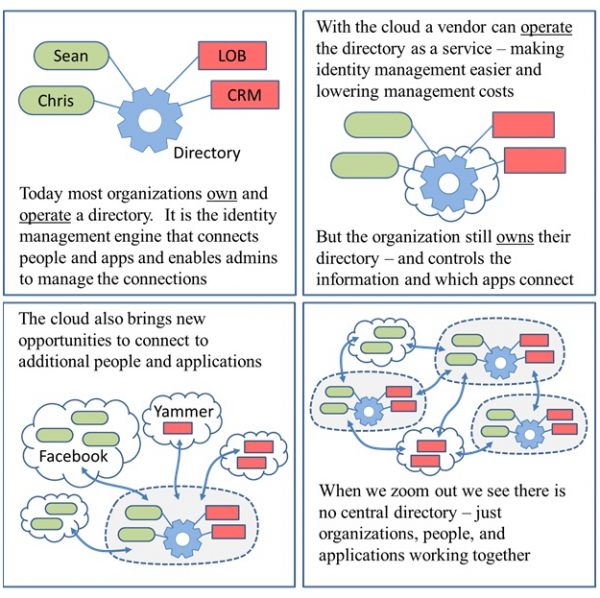Microsoft's Active Directory in the cloud: Test bits available

Microsoft has made available to testers the promised Windows Azure Active Directory (WAAD) bits.
WAAD is Microsoft's project to bring the Active Directory technology in Windows Server to the cloud. Microsoft already is using WAAD to manage and federate identities in Office 365, Windows Intune and Dynamics CRM Online. According to Microsoft, some select third-party developers to provide single sign-on and identity-management for their Azure-hosted applications.
Here's Microsoft's latest graphical representation of how WAAD works:

Microsoft announced the planned developer preview for WAAD on June 7. This preview would provide the ability to connect and use information in the directory through a REST interface, officials said. It also would enable third-party developers to connect to the SSO the way Microsoft's own apps do.
As of July 12, Microsoft delivered two new components in its WAAD Developer Preview release. These are the graph application programming interface and Web single sign-on. The preview also includes access to new REST programming interfaces, a set of demonstration applications, a way to get a trial Azure AD tenant and related documentation.
"With this preview, you can build cloud applications that integrate with Windows Azure AD providing a Single Sign-on experience across Office 365, your application and other applications integrated with the directory. These applications can also access Office 365 user data stored in Windows Azure AD (assuming the app has the IT admin and/or user’s permission to do so)," explained Microsoft officials in a blog post about the preview.
Microsoft is working to provide symmetry across its Windows Azure cloud and Windows Server back down on earth. WAAD is an example of a Windows Server capabiltiy being replicated in the cloud. But Microsoft also is doing the reverse: Moving a number of its cloud capabilities back down to Windows Server, such as the recently announced Linux and Windows Server virtual machine hosting; its Web-site hosting; and its management portal and framework.
Microsoft also just announced it is making a subset of its Azure Service Bus -- i.e., its messaging platform -- available on Windows Server. The Service Bus 1.0 beta is available for download by testers who want to use it on Windows Server 2008 R2.